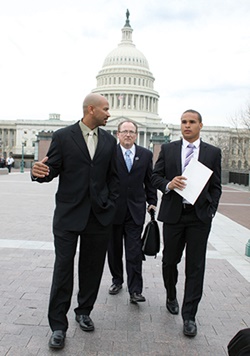The most basic problem with college sports is that the NCAA and a small percentage of its 1,200 or so members have commercialized college sports to the tune of billions of dollars a year. This is not a Division I, II, or III problem. This is a problem with the NCAA, the major conferences and the bowls (which are licensed or controlled by the NCAA and conferences), and the top third, at most, of Division I members that make significant profits on men’s football and basketball programs.
The sooner we realize that this is a discrete versus global problem, the better we will be able to frame a discussion that so far is largely unfocused and scattershot, mostly revolving around whether schools should pay players in the top third or so, while largely ignoring the universal problems in college sports, such as due process, graduation rates, insurance and safety issues, representation, and student welfare.
The answer to these problems is for Congress to regulate college sports. The NCAA and its members — colleges and universities, conferences, and the bowl games — have admitted to the Knight Commission that they are incapable of changing the system. So, if we want any — let alone real — change, there is one and only one place it will come from, and that is Congress, although some incremental changes may occur over the next five to 10 years through litigation and unionization efforts.
Why should Congress care?
College sports generate $12 billion in annual revenue, $10 billion of which comes from Division I — and within that division, $6 billion is generated by the major conferences and their member schools. Neither the states nor the federal government have delegated the regulation of college sports to the NCAA, but by historical accident and congressional apathy, the NCAA presumes to regulate close to a half-million college athletes every year, not to mention athletic department employees, while not allowing those athletes or employees membership in the NCAA or any say in how they are governed. Adding insult to injury, the NCAA disclaims any legal relationship with college athletes and employees.
Annually, federal student grants are $49 billion, federally guaranteed student loans now stand at $105 billion, and federal research grants add another $40 billion to higher education. State spending on higher education is $170 billion annually, and it averages about 10 percent of the states’ budgets, with a majority of the major revenue programs being state funded.
What do we get for this exorbitant support for higher education that looks socialistic? Abysmal graduation rates for the major revenue-producing programs. When one looks at the mythology of amateurism, one would expect participation in sports to increase the academic experience, but at the top programs, it does not. According to the College Sports Research Institute’s 2013 report, 18 percent fewer men graduated in the FBS than their full-time student counterparts. For black men, the number fell to 24 percent fewer; for white men, the number was 7 percent fewer. If you compare that to the less-lucrative FCS, the gaps lower to 9 percent, 10 percent, and 6 percent fewer, respectively — which makes sense, because those men have much less hope of being drafted, and that’s with the draft rate in the FBS at only about 1 percent.
 |
|
Former Northwestern QB Kain Colter (right) and Ramogi Huma of the National College Players Association sought allies on Capitol Hill for college athlete unionization efforts.
Photo by: AP IMAGES
|
If you look at men’s basketball, the numbers get even worse. And these are graduation rates over six years.
Legal questions
In the recent Northwestern University unionization effort, the football players would be “employees” rather than students, but if we accept that conclusion, then we’re accepting that educational institutions exist to exploit rather than educate some young men, and in the major revenue programs, this is true.
The solutions are many. Congress should amend the National Labor Relations Act to allow all students to unionize; imagine what will happen to the cost of college if parents and students could negotiate rates through a union. We shouldn’t have to reach the “employee” question, and all students should have this right, not just the few in the major revenue programs who want a cut of the pie.
So can the legal system bring about the systemic changes that are needed absent congressional intervention? Certainly, the current onslaught of major lawsuits threatens the NCAA’s very existence, and with more proposed class actions recently being filed against the NCAA and the major conferences, the pile-on has begun.
Regarding the licensing of broadcast rights, which represents a large percentage of the money at the center of these lawsuits, nobody can explain how the NCAA or its members have the exclusive right to be paid for recording or televising college athletes at play since they do not receive releases from, or pay any consideration to, any of them for this.
Assuming that the money dispute is resolved by paying college athletes at the top, how does this solve all of the other problems affecting college sports, from the concussion issue to the insurance issue to the student welfare issue and so on? And more importantly, do we want for-profit college sports within a government-subsidized higher education environment that taxpayers pay for?
It is time for Congress to step up to the plate, take control of the money and public policy issues in college sports, and set up an independent agency to regulate college sports with a commissioner at the helm to protect the “best interests of college sports.” It would operate as any other independent agency, with the president appointing a commissioner who would be approved by the Senate.
The current system at the major revenue programs does not work for anyone but the moneyed interests, and it certainly does not serve the public’s interest in supporting higher education, which is vital to our national security and world competitiveness. Higher education exists primarily because the public funds it at more than $350 billion a year, combining federal and state support. The public has a right to expect that it gets a return on its investment, and right now, the entire higher educational system is essentially unaudited from a learning perspective — yet we know, when we look at the graduation gaps cited above, there are huge chunks of the system that simply aren’t producing, and that is unacceptable.
An independent commissioner of college sports would be a good and logical first step to reforming the madness that is the tail wagging the dog.
Richard G. Johnson (rgj@rgjcolpa.com) was plaintiff’s counsel in Oliver v. NCAA, which established college athletes’ right to counsel, and he is the author of “Submarining Due Process: How the NCAA Uses its Restitution Rule to Deprive College Athletes of their Right of Access to the Courts … Until Oliver v. NCAA” from the Florida Coastal Law Review.
IT’S YOUR TURN TO SPEAK OUT
Guest columns may be sent to Street & Smith’s SportsBusiness Journal, 120 W. Morehead St., Suite 310, Charlotte, NC 28202. For further information, please contact Betty Gomes at (704) 973-1439 or bgomes@sportsbusinessjournal.com.





